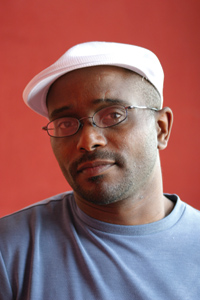|
||
      |
Peer Review ::
Poetry Jam
Poet Tyehimba Jess gives voice to blues legend Leadbelly.

Jess won a 2006 Whiting Writers’ Award for his poetry.
In 1924 blues musician Huddie “Leadbelly” Ledbetter, in prison for killing a man during a fight, strummed his guitar for Texas Governor Pat Neff and sang his way to a pardon. Nine years later, back behind bars for attempted homicide, he met musicologist John Lomax, who was collecting prison songs for the Library of Congress. After his release, Ledbetter toured the country with Lomax.
“I’m parole on parade, / I’m an ex-con’s keeper,” writes poet Tyehimba Jess, AB’91, imagining Leadbelly and Lomax’s contrasting travel experiences. Intrigued by Leadbelly’s “struggle to reclaim himself through his art,” Jess, an assistant professor of creative writing at the University of Illinois at Urbana–Champaign, spent five years researching and chronicling the musician’s life. The resulting collection of poems, leadbelly (Verse Press, 2005), was published as part of the 2004 National Poetry Series, a program started in 1978 and sponsored by several major corporations and foundations. In October Jess won a Whiting Writers’ Award, which recognizes emerging fiction writers, poets, and playwrights. Past winners of the $40,000 prize include novelist Jonathan Franzen, playwright Sarah Ruhl, and poet Jorie Graham.
A Detroit native, Jess began writing poems, mostly about his hometown, in junior high and did his first reading at age 17 as part of an NAACP poetry competition. “I talked about prostitution in the poem,” he laughs, recalling his nervousness before the audience of parents, teachers, and students. Since then, he’s presented his work in hundreds of readings and performance-poetry events. Although readings are works “for the page” spoken aloud while performance poetry is delivered specifically “for the ear,” Jess sees a common tie. “We’re all performing,” he says. “The challenge is to create a synthesis of text and sound, to create a world that absorbs the reader, both in the air and on the page.”
During poetry slams, Jess competes against other poets for points. Judges can be “anyone from a college professor to a night watchman to a nurse to an accountant,” explains the former member of Chicago’s Green Mill slam team. Scores range from zero (“absolutely terrible”) to ten (“perfect”), although either extreme is rare. Jess, who has published in Mid-American Review, Callaloo, and several other literary journals, equates poetry slams to the scholarly review process. “Your audience is generally a bit drunker than some of the editors at the journals,” he jokes. “That’s about it.”
Diverse audiences don’t bother Jess. A former faculty member at the Juilliard School and New York University (where he received his poetry MFA in 2004), he’s taught poetry workshops to students K–12, hospital patients, and inmates. The most challenging group, says Jess, are middle schoolers. “They’re sharpening their cynicism as much as they possibly can and can be reluctant to believe in the magic of poetry.” To win them over, he often uses metered verse. “They want to know exactly what to do to make a poem, so when you show them the exact steps in a sonnet, it’s something really tangible to latch on to.”
Influenced by his former teacher, African American poet and University of Illinois at Chicago professor emeritus Sterling Plumpp, as well as by Cave Canem, a collective of black poets to which he belongs, Jess believes it’s important to affirm black writers. He hopes to encourage promising young talent, using part of his Whiting prize funds for an undergraduate poetry contest about the African American experience—a consistent theme in his own work.
As for other future projects, Jess says he has a few more biographies in mind. “There are so many people to write about,” he says, “so many stories to tell.